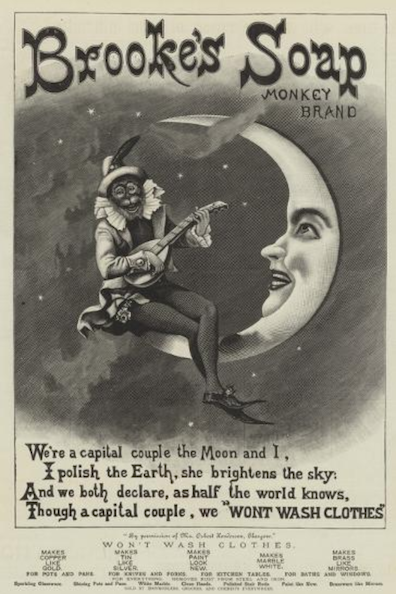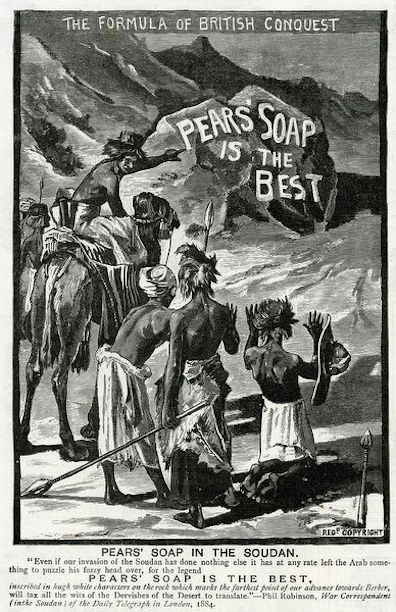Standing in the pharmacy, Bloom thinks that taking a bath
before his 11:00 appointment will fortify his mood: "Feel
fresh then all day. Funeral be rather glum." He picks up a
cake of soap, inhales its lemony aroma, buys it (payment to be
made later), and strolls out of the shop only to run
immediately into a walking refutation of cleanliness in the
person of Bantam Lyons: "yellow blacknailed fingers," "rough
dirt" everywhere, "Dandruff on his shoulders." Bloom thinks of
the ad for Pears' soap, and when he finally gets free of Lyons
he folds the soap carefully in his newspaper and walks toward
the baths, imagining soothing warm water "oiled by scented
melting soap."
These paragraphs at the end of Lotus Eaters portray a
man who values the power of cleanliness to stave off the daily
miseries of life: dirty people shuffling around a dirty city,
moral indifference and personal neglect, the depressing
reality of death and loss. Much later in the novel, Joyce
repeats the scene with some variations as Bloom returns home.
Welcoming Stephen to Eccles Street, he sets a kettle on the
fire to boil water for cocoa and returns to the tap "To
wash his soiled hands with a partially consumed tablet of
Barrington's lemonflavoured soap, to which paper still
adhered (bought thirteen hours previously for fourpence and
still unpaid for), in fresh cold neverchanging everchanging
water and dry them, face and hands, in a long redbordered
holland cloth passed over a wooden revolving roller."
There is an air of ritual in Bloom's washing the dirt of
Dublin off his body both before and after his long trek, and
on both occasions Joyce heightens the effect by providing a
foil to his protagonist's cleanliness. Apparently Bloom offers
Stephen a chance to join him in washing up, because Stephen
gives a reason for declining: "That he was hydrophobe, hating
partial contact by immersion or total by submersion in cold
water (his last bath having taken place in the month of
October of the preceding year)." Bloom is tempted to give his
filthy guest some "counsels of hygiene and prophylactic,"
along with some obsessive-compulsive
tips for bathing ("a preliminary wetting of the head and
contraction of the muscles with rapid splashing of the face
and neck and thoracic and epigastric region in case of sea or
river bathing"), but he wisely bites his tongue to preserve
the spirit of comity that he has only recently achieved with
Stephen.
Together these scenes characterize soap as a kind of
protector of personal integrity, guarding the boundary between
the pristine self and the dirty world outside it. Joyce
suggests its psychological power even more strikingly at the
end of Lestrygonians as Bloom desperately tries to
avoid running into Blazes Boylan in the street. Heart racing
and breath fluttering, he heads for the gate of the National
Museum while frantically searching his pockets, taking strange
comfort in what he at last finds there:
His hasty hand went quick
into a pocket, took out, read unfolded Agendath Netaim. Where
did I?
Busy looking for.
He thrust back quickly
Agendath.
Afternoon she said.
I am looking for that. Yes,
that. Try all pockets. Handker. Freeman. Where did I? Ah, yes.
Trousers. Purse.
Potato. Where
did I?
Hurry. Walk quietly. Moment
more. My heart.
His hand looking for the where
did I put found in his hip pocket soap lotion have to call
tepid paper stuck. Ah, soap there! Yes. Gate.
Safe!
Bloom's searching of his pockets is no doubt
a show calculated to account for
his not looking up and risking eye contact with Boylan before he
gets safely through the museum gate. But the panic is real, and
the text's suggestion that he triumphantly discovers the thing
he is looking for—"
Ah, soap there! Yes"—creates the
impression that the soap is as much his savior as the gate is.
Against what feels like a mortal threat ("My heart"), Bloom
takes comfort in the nugget of sweet-smelling cleanliness that
he carries in his pocket. In
Hades, perhaps
coincidentally, he notices the soap––"
Ah, that soap: in
my hip pocket. Better shift it out of that"––just after thinking
distastefully that the laying out of corpses is an "Unclean
job."
His fetishistic attachment to soap might seem to call for some
kind of psychoanalytic explanation, but what
Ulysses
gives its readers instead are hints of the power of late 19th
century commodity advertising. Explored as a cultural studies
phenomenon in Thomas Richards' book
The Commodity Culture of
Victorian England: Advertising and Spectacle, 1851-1914 (1990)
and Anne McClintock's
Imperial Leather: Race, Gender, and
Sexuality in the Colonial Conquest (1995), soap ads were
brought into Joyce studies by Hye Ryoung Kil in an article
titled "Soap Advertisements and
Ulysses: The Brooke's
Monkey Brand Ad and the Capital Couple,"
JJQ 47.3
(2010): 417-26. These three works provide some highly suggestive
context for Bloom's strong attachment.
In the second half of the 19th century toilet soap, previously
the privilege of the rich, began to be mass-produced and
marketed to middle-class consumers who appreciated its ability
to differentiate them from the grimy working classes. Starting
in 1884, a brand called Pears' Soap began touting its product in
ads that aligned personal cleanliness not only with freedom from
manual labor but also with superiority to the dark-skinned
laborers in Britain's colonies. Omnipresent print ads promised
to lift users of their soap into the ruling class, asking, "
Good
morning! Have you used Pears' Soap?"
So pervasive was this advertising that, according to a book by
James B. Twitchell cited in one of Kil's endnotes, well-bred
Victorians became leery of saying "good morning" to one another,
lest they seem to be repeating the language of the ads. Bloom,
however, does not sound very embarrassed when he imagines
spouting the line to the filthy Bantam Lyons. He evidently
thinks that the man should improve himself.
It is hard to know just how much purchase the ad may have on
Bloom's thinking. He is an advertising man, after all, and
jingles and pitches pass through his mind all day without
necessarily saying much about his beliefs. But the novel does
provide plenty of hints about how the British ideal of
cleanliness embodied in the soap ads might appeal to a man in
Bloom's social station. The British had long sought to suggest
that the white people they colonized on the island next door
were somehow racially different from themselves, presenting the
Irish in countless cartoons as dirty, hairy, negroid ape-men.
And Bloom, of course, has an additional racial hurdle to
surmount: he struggles even to be accepted as legitimately
Irish. In
Cyclops the Citizen calls him a "
whiteeyed kaffir,"
demeaning him by association with Africans just as the English
did with the Irish.
The sense of racial inferiority that Bloom struggles with can be
seen in the language that he uses in
Lestrygonians to
characterize Reuben J. Dodd, a man whom he takes to be Jewish
but less successful at integrating himself into Gentile society:
"
Now he’s really what they call a dirty jew." His love of
hygeine may well contain an element of
servile aspiration. The Pears
ads, without doubt, encouraged and justified such aspiration. As
Kil observes, "The possibility of racial cleansing and the
progress of the dominated depicted in soap ads subversively
challenged the idea that cleanliness was uniquely English....
the virtuousness of white civilization appeared to be a cultural
rather than a natural attribute that anyone could purchase"
(418).
The ad parodied in
Circe was for a different kind of
soap, one used for cleaning household surfaces rather than the
human body. "Brooke's Soap Monkey Brand," manufactured by an
American company, was advertised in 1891 in an image that showed
a minstrel-like monkey sitting on the tip of the crescent moon
and singing, "
We're a capital couple the Moon and I, / I
polish the earth, she brightens the sky." Only this one ad
used the conceit of the moon, but many others featured the
dressed-up monkey. Its resemblance to 19th century depictions of
Irishmen and Blacks is probably not accidental. Kil suggests
that the monkey stood in for all those people (manual laborers,
women, colonial subjects) on whose backs empire was built and
households cleaned, while simultaneously suggesting that the
soap had magically rendered brute labor unnecessary.
By substituting Bloom for this half-civilized simian, the novel
may be portraying its protagonist as an Irish-Jewish mongrel who
believes that the right kind of soap can confer a kind of racial
purity. But the Monkey Brand ads appeared to target class and
gender as much as race: they evoked a world in which household
cleaning was accomplished by the magic of modern chemistry
rather than by the arms of
charwomen.
This distancing of consciousness from the labor of domestic help
has a presence in
Circe. Twenty pages after the parody
of the Brooke's ad, a woman who performed menial physical labor
in Bloom's home, Mary Driscoll, accuses him of having
propositioned her, and he uses racially suggestive language to
refute her: "
I treated you white. I gave you mementos,
smart emerald garters far above your station. Incautiously I
took your part when you were accused of pilfering." Mary here is
the monkey in the house, magically ennobled and effaced by the
kind of thinking that polishes the earth and brightens the sky.
Kil's article raises another line of questioning whose
implications are very murky, but probably worth mentioning. In
1899 the British firm Lever Brothers bought Brooke's Soap
after noting its effectiveness in selling household soap,
which British manufacturers had not previously bothered to
advertise. In British hands the ads for Monkey Brand came to
more closely resemble the Pears ads promising to civilize the
dusky world. Did Joyce view the two soaps through the same
colonialist lens? This seems possible, but Kil also suggests
that he may have felt more sympathetic toward the company that
produced the 1891 ad because it was American. The soap that
Bloom carries around all day is Irish, and in Lestrygonians
he thinks happily of giving Milly baths with an "American
soap I bought: elderflower." When the Irish soap
diffuses light and perfume about the sky and proclaims in an
American spirit that "We're a capital couple are Bloom and
I," could it possibly be evoking independence from
colonial domination rather than submission to it? This is one
of several tantalizing questions raised, but hardly answered,
by the novel's engagement with soap ads.





